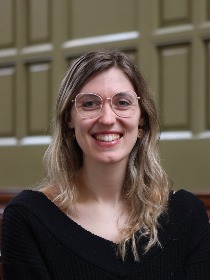S. (Sarah) Tol, MSc

Compensatoire Leestraining voor Mensen met Homonieme Visuele Veld Defecten – Een Randomized Controlled Trial
Een van de meest gerapporteerde klachten bij gezichtsvelduitval na hersenletsel is problemen bij het lezen. Mensen met blindheid voor de helft van visuele veld door hersenletsel (homonieme hemianopsie) ervaren bijvoorbeeld moeilijkheden zoals langzamer lezen, meer fouten maken, sneller moe worden en de tekst minder goed begrijpen.
In het project 'Leestraining bij Hemianopsie' wordt de effectiviteit van twee leestrainingen onderzocht: Vistra en geroteerd lezen. Het doel van Vistra is dat iemand met gezichtsvelduitval leert om compenserende oogbewegingen tijdens het lezen te maken, zodat minder hinder van de gezichtsvelduitval wordt ervaren. Bij geroteerd lezen wordt de leesrichting van de tekst gedraaid, bijvoorbeeld diagonaal of verticaal, waardoor iemand met gezichtsvelduitval de tekst beter kan overzien. De optimale hoek wordt bepaald op basis van een gezichtsveldmeting en mensen leren deze techniek zelf toe te passen.
De opzet van het onderzoek maakt het mogelijk het effect van de trainingen ten opzichte van een controlegroep te meten, maar ook het effect van de trainingen onderling te vergelijken. Ook zal het onderzoek meer inzicht verschaffen in de leesstrategieën van mensen met hemianopsie. Met behulp van een follow-up meting wordt onderzocht of eventuele effecten ook blijvend zijn.
Het project resulteert uiteindelijk in onderbouwde kennis over de effectiviteit van twee leestrainingen voor mensen met hemianopsie. Het uiteindelijke doel is dat mensen met hemianopsie makkelijker kunnen lezen, met behulp van een training die bij hen past.
Subsidie: ZonMw-InZicht 94313005
1-minuut pitch: https://youtu.be/xcwbUr2sY4I
De DiaNAH Testbatterij voor Visuele Perceptie: Een Normerings- en Valideringsstudie
Om de diagnostiek en revalidatie van visuele perceptiestoornissen na niet-aangeboren hersenletsel (NAH) doelmatiger te maken, richtlijnen te ontwikkelen en kennis te vergaren, is in de afgelopen jaren de diagnostische werkwijze NAH (DiaNAH) ontwikkeld door Koninklijke Visio in samenwerking met Bartiméus en de Rijksuniversiteit Groningen. De DiaNAH testbatterij wordt in de praktijk gebruikt bij de diagnostiek van het overgrote deel van de cliënten met NAH en wordt afgenomen met behulp van een grote computertablet. Om te kunnen bepalen hoe een cliënt heeft gepresteerd op de DiaNAH testbatterij is het van belang een representatieve normgroep te verzamelen. Daarnaast is er nog relatief weinig bekend over de validiteit en de diagnostische nauwkeurigheid van de DiaNAH testbatterij. Het huidige onderzoek heeft als doel kwalitatief hoogwaardige diagnostiek voor mensen met NAH te kunnen garanderen. Hiervoor worden normgegevens verzameld en berekend en wordt de validiteit van de DiaNAH testbatterij nader onderzocht.
De volgende personen zijn betrokken bij dit project: Sarah Tol, Msc, dr. Janneke Koerts, dr. Joost Heutink, Stefanie de Vries, Msc, dr. Gera de Haan en prof. dr. Oliver Tucha.
